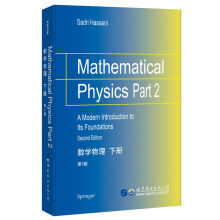数学物理(下册 )第2版

1 Mathematical Preliminaries
1.1 Sets
1.1.1 Equivalence Relations
1.2 Maps
1.3 Metric Spaces
1.4 Cardinality
1.5 Mathematical Induction
1.6 Problems
Part Ⅰ Firute-Dimensional Vector Spaces
2 Vectors and Linear Maps
2.1.1 Subspaces
2.1.2 Factor Space
2.1.3 Direct Sums
2.1.4 Tensor Product of Vector Spaces
2.2 Inner Product
2.2.1 Orthogonality
2.2.2 The Gram-Schmidt Process
2.2.3 The Schwarz Inequality
2.2.4 Length of a Vector
2.3 Linear Maps
2.3.1 Kernel of a Linear Map
2.3.2 Linear Isomorphism
2.4 Complex Structures
2.5 Linear Functionals
2.6 Multilinear Maps
2.6.1 Determinant of a Linear Operator
2.6.2 Classical Adjoint
2.7 Problems
3 Algebras
3.1 From Vector Space to Algebra
3.1.1 General Properties
3.1.2 Homomorphisms
3.2 Ideals
3.2.1 Factor Algebras
3.3 Total Matrix Algebra
3.4 Derivation of an Algebra
3.5 Decomposition of Algebras
3.5.1 The Radical
3.5.2 Semi-simple Algebras
3.5.3 Classification of Simple Algebras
3.6 Polynomial Algebra
3.7 Problems
4 Operator Algebra
4.1 Algebra of End(V)
4.1.1 Polynomials of Operators
4.1.2 Functions of Operators
4.1.3 Commutators
4.2 Derivatives of Operators
4.3 Conjugation of Operators
4.3.1 Hermitian Operators
4.3.2 Unitary Operators
4.4 Idempotents
4.4.1 Projection Operators
4.5 Representation of Algebras
4.6 Problems
5 Matrices
5.1 Representing Vectors and Operators
5.2 Operations on Matrices
5.3 Orthonormal Bases
5.4 Change of Basis
5.5 Determinant of a Matrix
5.5.1 Matrix of the Classical Adjoint
5.5.2 Inverse of a Matrix
5.5.3 Dual Determinant Function
5.6 The Trace
5.7 Problems
6 Spectral Decomposition
6.1 Invariant Subspaces
6.2 Eigenvalues and Eigenvectors
6.3 Upper-Triangular Representations
6.4 Complex Spectral Decomposition
6.4.1 Simultaneous Diagonalization
6.5 Functions of Operators
6.6 Real Spectral Decomposition
6.6.1 The Case of Symmetric Operators
6.6.2 The Case of Real Normal Operators
6.7 Polar Decomposition
6.8 Problems
Part Ⅱ Infinite-Dimensional Vector Spaces
7 Hilbert Spaces
7.1 The Question of Convergence
7.2 The Space of Square-Integrable Functions
7.2.1 Orthogonal Polynomials
7.2.2 Orthogonal Polynomials and Least Squares
7.3 Continuous Index
7.4 Generalized Functions
7.5 Problems
8 Classical Orthogonal Polynomials
8.1 General Properties
8.2 Classification
8.3 Recurrence Relations
8.4 Details of Specific Examples
8.4.1 Hermite Polynonuals
8.4.2 Laguerre Polynomials
8.4.3 Legendre Polynonuals
8.4.4 Other Classical Orthogonal Polynomials
8.5 Expansionin Terms of Orthogonal Polynomials
8.6 Generating Functions
8.7 Problems
9 Fourier Analysis
9.1 Fourier Analysis
9.1.1 The Gibbs Phenomenon
9.1.2 Fourier Seriesin Higher Dimensions
9.2 Fourier Transform
9.2.1 Fourier Transforms and Derivatives
9.2.2 The Discrete Fourier Transform
9.2.3 Fourier Transform of a Distribution
9.3 Problems
Part Ⅲ Complex Analysis
10 Complex Calculus
10.1 Complex Functions
10.2 Analytic Functions
10.4 Integration of Complex Functions
10.5 Derivatives aslntegrals
10.6 Infinite Complex Series
10.6.1 Properties of Series
10.6.2 Taylor and Laurent Series
10.7 Problems
11 Calculus of Residues
11.1 Residues
11.2 Classification of Isolated Singularities
11.3 Ebaluation of Definite Integrals
11.3.1 Integrals of Rational Functions
11.3.2 Products of Rational and Trigonometric Functions
11.3.3 Functions of Trigonometric Functions
11.3.4 Some Otherlntegrals
11.3.5 Principal Value of an lntegral
11.4 Problems
12 Advanced Topics
12.1 Meromorphic Functions
12.2 Multivalued Functions
12.2.1 Riemann Surfaces
12.3 Analytic Continuation
12.3.1 The Schwarz Reflection Principle
12.3.2 Dispersion Relations
12.4 The Gamma and Beta Functions
12.5 Method of Steepest Descent
12.6 Problems
Part Ⅳ Differential Equations
13 Separation of Variablesin Spherical Coordinates
13.1 PDEs of Mathematical Physics
13.2 Separation of the Angular Part
13.3 Construction of Eigenvalues of L2
13.4 Eigenvectors of L2: Spherical Harmonics
13.4.1 Expansion of Angular Functions
13.4.2 Addition Theorem for Spherical Harmonics
13.6 Problems
14 Second-Order Linear Differential Equations
14.1 General Properties of ODEs
14.2 Existence/Uniquenessfor First-OrderDEs
14.3 General Properties of SOLDEs
14.4.1 A Second Solution to the HSOLDE
14.4.2 The General Solution to an ISOLDE
14.4.3 Separation and Comparison Theorems
14.5 Adjoint Differential Operators
14.6 Power-Series Solutions of SOLDEs
14.6.1 Frobenius Method of Undetermined Coefficients
14.6.2 Quantum Harmonic Oscillator
14.7 SOLDEs with ConstantCoefficients
14.8 The WKB Method
14.8.1 Classical Limit of the Schrodinger Equation
14.9 Problems
……
15 Complex Analysis of SOLDEs
16 Integral Transforms and Differential Equations
Part Ⅴ Operators on Hilbert Spaces
Part Ⅵ Green's Functions
Part Ⅶ Groups and Their Representations
Part Ⅷ Tensors and Manifolds
Part Ⅸ Lie Groups and Their Applications
Part Ⅹ Fiber Bundles
1.1 Sets
1.1.1 Equivalence Relations
1.2 Maps
1.3 Metric Spaces
1.4 Cardinality
1.5 Mathematical Induction
1.6 Problems
Part Ⅰ Firute-Dimensional Vector Spaces
2 Vectors and Linear Maps
2.1.1 Subspaces
2.1.2 Factor Space
2.1.3 Direct Sums
2.1.4 Tensor Product of Vector Spaces
2.2 Inner Product
2.2.1 Orthogonality
2.2.2 The Gram-Schmidt Process
2.2.3 The Schwarz Inequality
2.2.4 Length of a Vector
2.3 Linear Maps
2.3.1 Kernel of a Linear Map
2.3.2 Linear Isomorphism
2.4 Complex Structures
2.5 Linear Functionals
2.6 Multilinear Maps
2.6.1 Determinant of a Linear Operator
2.6.2 Classical Adjoint
2.7 Problems
3 Algebras
3.1 From Vector Space to Algebra
3.1.1 General Properties
3.1.2 Homomorphisms
3.2 Ideals
3.2.1 Factor Algebras
3.3 Total Matrix Algebra
3.4 Derivation of an Algebra
3.5 Decomposition of Algebras
3.5.1 The Radical
3.5.2 Semi-simple Algebras
3.5.3 Classification of Simple Algebras
3.6 Polynomial Algebra
3.7 Problems
4 Operator Algebra
4.1 Algebra of End(V)
4.1.1 Polynomials of Operators
4.1.2 Functions of Operators
4.1.3 Commutators
4.2 Derivatives of Operators
4.3 Conjugation of Operators
4.3.1 Hermitian Operators
4.3.2 Unitary Operators
4.4 Idempotents
4.4.1 Projection Operators
4.5 Representation of Algebras
4.6 Problems
5 Matrices
5.1 Representing Vectors and Operators
5.2 Operations on Matrices
5.3 Orthonormal Bases
5.4 Change of Basis
5.5 Determinant of a Matrix
5.5.1 Matrix of the Classical Adjoint
5.5.2 Inverse of a Matrix
5.5.3 Dual Determinant Function
5.6 The Trace
5.7 Problems
6 Spectral Decomposition
6.1 Invariant Subspaces
6.2 Eigenvalues and Eigenvectors
6.3 Upper-Triangular Representations
6.4 Complex Spectral Decomposition
6.4.1 Simultaneous Diagonalization
6.5 Functions of Operators
6.6 Real Spectral Decomposition
6.6.1 The Case of Symmetric Operators
6.6.2 The Case of Real Normal Operators
6.7 Polar Decomposition
6.8 Problems
Part Ⅱ Infinite-Dimensional Vector Spaces
7 Hilbert Spaces
7.1 The Question of Convergence
7.2 The Space of Square-Integrable Functions
7.2.1 Orthogonal Polynomials
7.2.2 Orthogonal Polynomials and Least Squares
7.3 Continuous Index
7.4 Generalized Functions
7.5 Problems
8 Classical Orthogonal Polynomials
8.1 General Properties
8.2 Classification
8.3 Recurrence Relations
8.4 Details of Specific Examples
8.4.1 Hermite Polynonuals
8.4.2 Laguerre Polynomials
8.4.3 Legendre Polynonuals
8.4.4 Other Classical Orthogonal Polynomials
8.5 Expansionin Terms of Orthogonal Polynomials
8.6 Generating Functions
8.7 Problems
9 Fourier Analysis
9.1 Fourier Analysis
9.1.1 The Gibbs Phenomenon
9.1.2 Fourier Seriesin Higher Dimensions
9.2 Fourier Transform
9.2.1 Fourier Transforms and Derivatives
9.2.2 The Discrete Fourier Transform
9.2.3 Fourier Transform of a Distribution
9.3 Problems
Part Ⅲ Complex Analysis
10 Complex Calculus
10.1 Complex Functions
10.2 Analytic Functions
10.4 Integration of Complex Functions
10.5 Derivatives aslntegrals
10.6 Infinite Complex Series
10.6.1 Properties of Series
10.6.2 Taylor and Laurent Series
10.7 Problems
11 Calculus of Residues
11.1 Residues
11.2 Classification of Isolated Singularities
11.3 Ebaluation of Definite Integrals
11.3.1 Integrals of Rational Functions
11.3.2 Products of Rational and Trigonometric Functions
11.3.3 Functions of Trigonometric Functions
11.3.4 Some Otherlntegrals
11.3.5 Principal Value of an lntegral
11.4 Problems
12 Advanced Topics
12.1 Meromorphic Functions
12.2 Multivalued Functions
12.2.1 Riemann Surfaces
12.3 Analytic Continuation
12.3.1 The Schwarz Reflection Principle
12.3.2 Dispersion Relations
12.4 The Gamma and Beta Functions
12.5 Method of Steepest Descent
12.6 Problems
Part Ⅳ Differential Equations
13 Separation of Variablesin Spherical Coordinates
13.1 PDEs of Mathematical Physics
13.2 Separation of the Angular Part
13.3 Construction of Eigenvalues of L2
13.4 Eigenvectors of L2: Spherical Harmonics
13.4.1 Expansion of Angular Functions
13.4.2 Addition Theorem for Spherical Harmonics
13.6 Problems
14 Second-Order Linear Differential Equations
14.1 General Properties of ODEs
14.2 Existence/Uniquenessfor First-OrderDEs
14.3 General Properties of SOLDEs
14.4.1 A Second Solution to the HSOLDE
14.4.2 The General Solution to an ISOLDE
14.4.3 Separation and Comparison Theorems
14.5 Adjoint Differential Operators
14.6 Power-Series Solutions of SOLDEs
14.6.1 Frobenius Method of Undetermined Coefficients
14.6.2 Quantum Harmonic Oscillator
14.7 SOLDEs with ConstantCoefficients
14.8 The WKB Method
14.8.1 Classical Limit of the Schrodinger Equation
14.9 Problems
……
15 Complex Analysis of SOLDEs
16 Integral Transforms and Differential Equations
Part Ⅴ Operators on Hilbert Spaces
Part Ⅵ Green's Functions
Part Ⅶ Groups and Their Representations
Part Ⅷ Tensors and Manifolds
Part Ⅸ Lie Groups and Their Applications
Part Ⅹ Fiber Bundles
S. Hassani(S.哈桑尼)是美国Illinois State 大学物理系教授,本书第1版出版后受到好评,第2版重写了许多章节,新增的章节包括代数、克里福代数的表示、纤维丛和规范场等内容。
本书是为学习物理学的读者编写的数学基础教材,书中除了用较现代的方法处理经典的数学物理问题外,还引入了很多有较强物理应用意义的现代数学方法和思想,从涵盖的知识面来看,已远远超出通常数学物理方法教程的范围,因此可以供更大范围的读者参考选用。与第1版相比,第2版重写了许多章节,新增的章节包括代数、克里福代数的表示、纤维丛等内容.
比价列表价格走势






 缺书网
缺书网 扫码进群
扫码进群